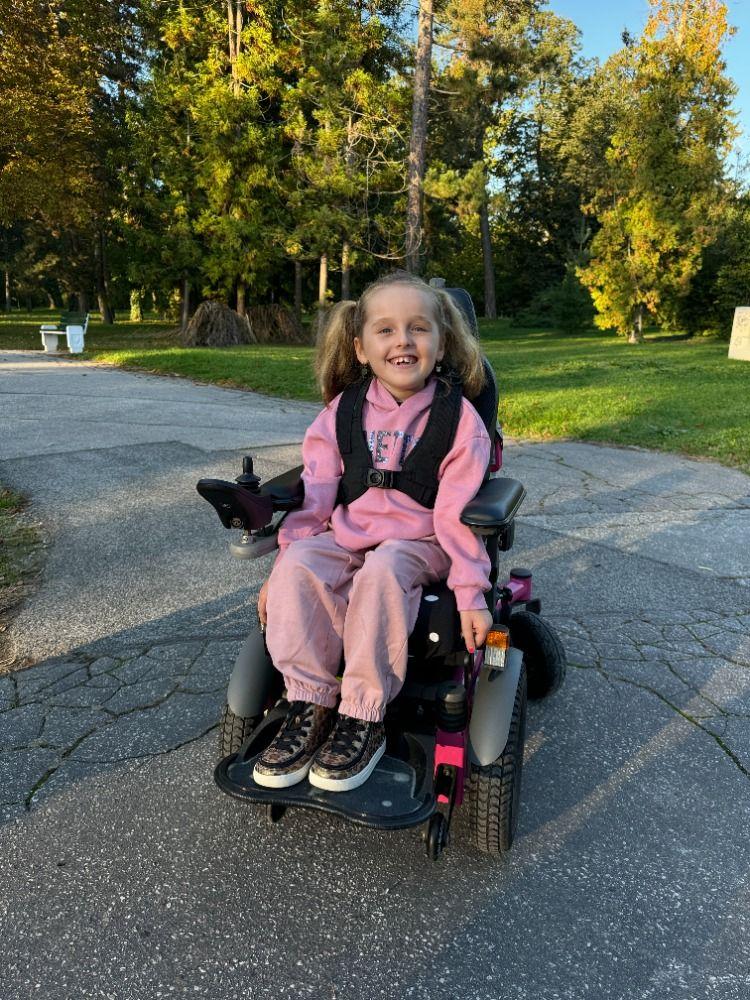Heroes we helped thanks to the Advent Running 2025
In December, we didn’t run for just 11 heroes as we had originally planned. Thanks to the incredible support and energy of all the runners and donors, we ultimately managed to raise support for an amazing 21 heroes.
Every year, we select our heroes based on nominations that anyone can make. The nominees are people, who face challenges all their life and they keep on fighting. And we are glad we can help them by financing their medical equipment or special therapies.
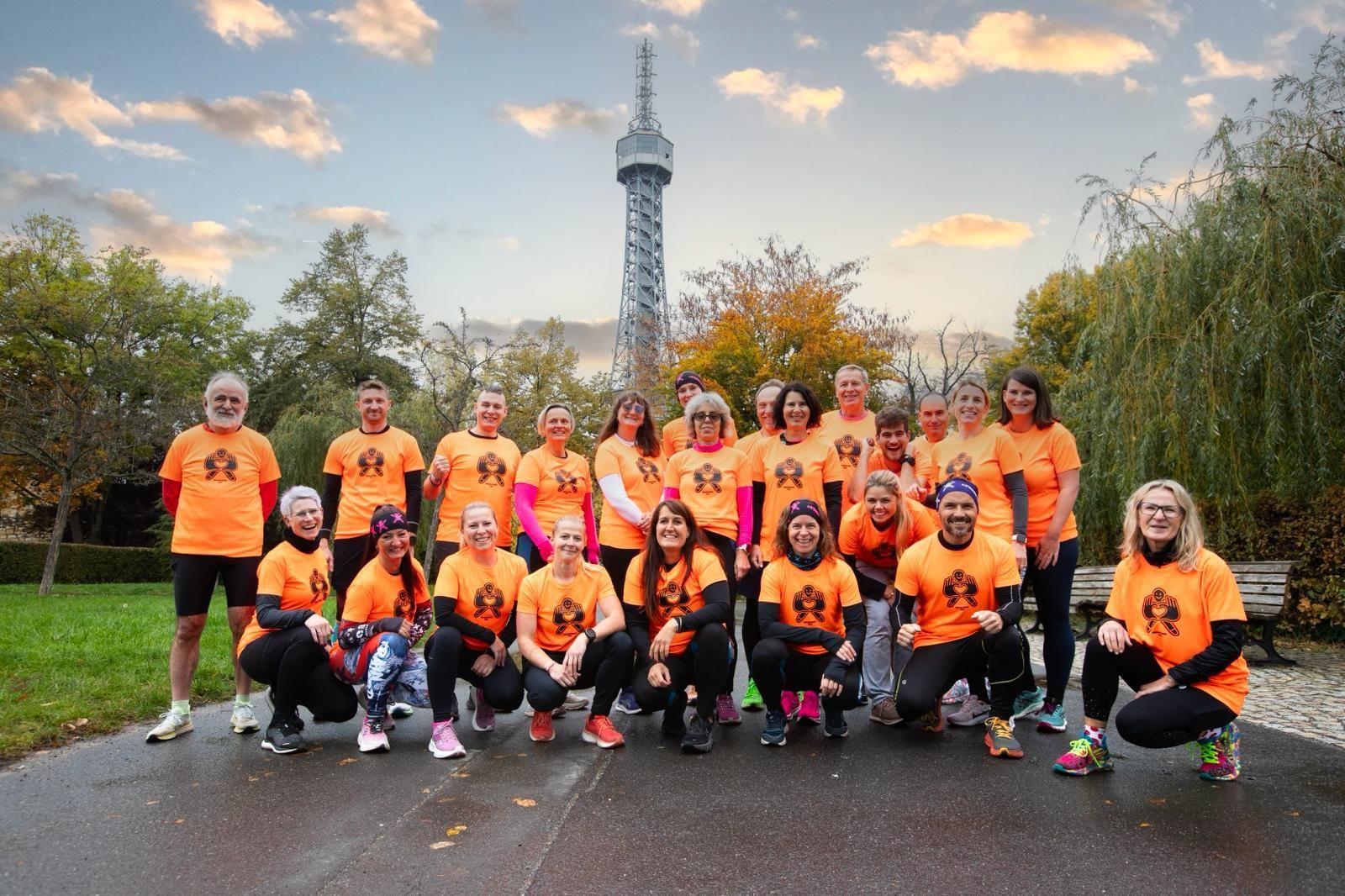
Get to know the heroes whose stories inspired us to run together in December
Pavlík
When little Pavlík came into the world four years ago, his start in life was anything but easy. Complications during birth meant he had to spend his first days in intensive care. Since then, both his and his family’s lives have been filled with doctors, therapy sessions, and daily challenges.
Even as a baby, it was clear that Pavlík’s development wasn’t following the usual path. Although doctors initially reassured his parents that everything was fine, they felt deep down that something wasn’t right — and they sought help early. Over time, doctors diagnosed Pavlík with childhood autism, moderate intellectual disability, attention and behavioral disorders, as well as sensory processing and sleep disorders.
Despite all the challenges, Pavlík’s family has built their lives around helping him grow, learn, and find peace in the world around him. Their days are carefully planned to give him every possible opportunity to move forward — to be calmer, happier, and more connected.
Pavlík regularly takes part in occupational therapy, snoezelen therapy, hippotherapy, and other activities that help him progress. He also attends a special school, where he’s doing really well — but the tuition fees are a heavy financial burden for his family.
How did the Advenťák runners help Pavlík?
The Advenťák runners funded Pavlík’s occupational therapy and hippotherapy.
Štěpán
The story of 15-year-old Štěpánek began even before he was born, while he was still in his mother’s womb. Back then, he wasn’t alone — he was sharing that space with two siblings. Early in the pregnancy, doctors decided that one of the fetuses would need to be removed to increase the chances that at least two of the babies would be born completely healthy. Unfortunately, a tragic medical error occurred — the healthy fetus was terminated, and one of the remaining fetuses was injured. And so Štěpánek was born.
At six months old, he had to undergo brain surgery to allow his brain to develop symmetrically. During an MRI scan, doctors diagnosed him with neurological brain damage accompanied by epilepsy, impaired interhemispheric communication, severe hypotonic syndrome, and cerebral palsy.
Štěpánek is fully dependent on the help of others. He communicates with the world around him through a special sign language adapted to his limited motor skills and with the help of a tablet application that uses spoken pictograms. He enjoys ball games and exercising in a special gym designed for his needs.
For the past few years, Štěpánek has lived with his mother and his twin brother Aleš.
How did the Advenťák runners help Štěpán?
The Advenťák runners secured neurorehabilitation for Štěpán at the Pokrok Center.
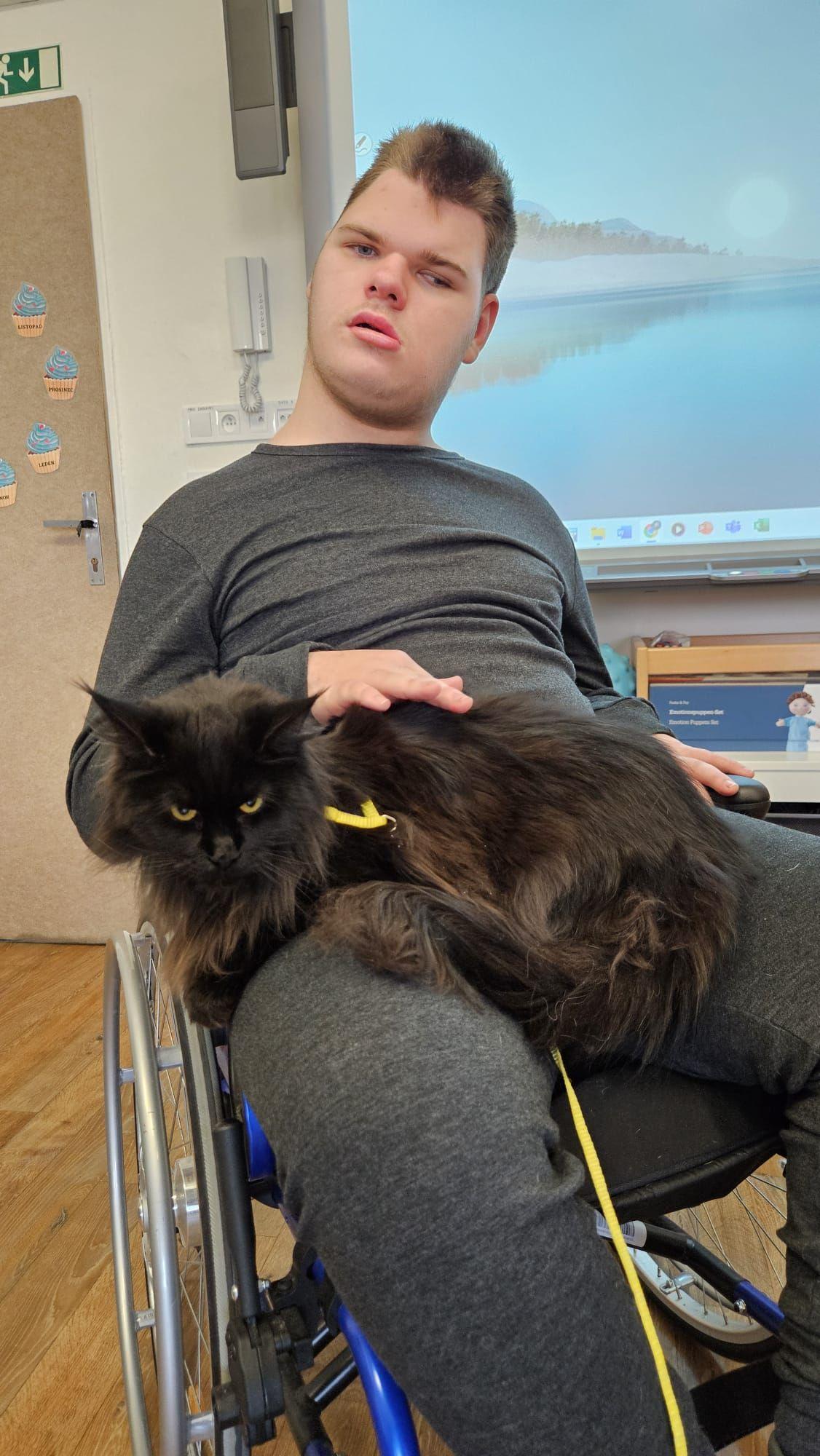
Viktorka
Viktorka is a cheerful seven-year-old girl who came into the world under difficult circumstances — she was born with oxygen deprivation, hypotonia, and a large diastasis. Despite this, she was discharged from the hospital as an apparently healthy newborn. Over time, however, her development began to lag behind. When she was two years old, she finally underwent neurological examinations and her first stay at a rehabilitation spa, where she learned how to walk.
Sadly, as time went on, Viktorka stopped speaking, playing, using her hands, and even eating on her own.
On October 27, 2023, her parents heard the diagnosis for the first time — Rett syndrome. It is a serious neurodevelopmental genetic disorder that causes regression in psychomotor development and comes with many additional complications.
Viktorka cannot eat or dress by herself, she wears diapers, and she struggles to walk — outdoors she always needs support or a stroller. She has severe problems with motor coordination and cannot use her hands, which means she cannot communicate in any way, not even through sign language or picture cards. Despite all these difficulties, her understanding of language and her social contact are gradually improving.
During her stay at the rehabilitation spa, Viktorka was introduced to a special communication program on a tablet that can be controlled with her eyes. She quickly understood how to use this assistive communication device, and her parents would very much like to get one for her. Unfortunately, this device is extremely expensive, and neither the health insurance company nor the local authority agreed to cover the cost.
How did the Advenťák runners help Viktorka?
purchased a Tobii Dynavox communication device for Viktorka.
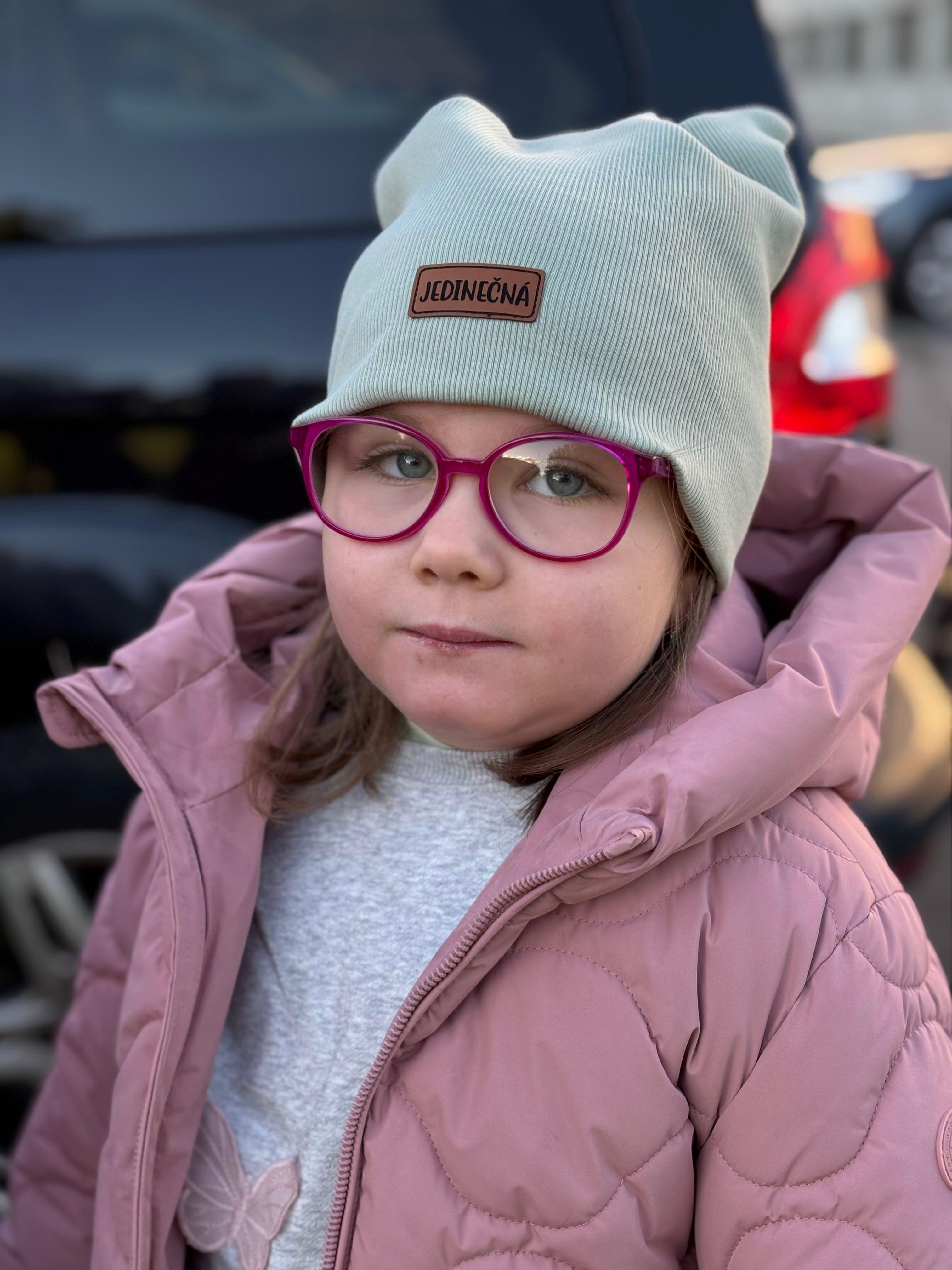
Lidka
Lidka is a 12-year-old girl who was born healthy. However, during her preschool years, she began experiencing weakness in her legs, balance problems, and severe fatigue. Over time, her condition gradually worsened, and after her eighth birthday, Lidka was diagnosed with a very rare genetic disorder: Gorden-Holmes and Boucher-Neuhauser syndromes. It is a progressive neuromuscular disease that affects both the lower and upper limbs as well as parts of the autonomic muscles. Retinal dystrophy is also sometimes present. Unfortunately, there is no treatment for this condition.
Lidka’s mobility in her legs is gradually decreasing, she is losing muscle mass and strength, and her feet and overall posture are becoming deformed. This spring, she underwent a complex surgery on both legs, which allowed her to walk again with the help of orthoses and crutches.
Further surgeries and casting of her legs are expected in the near future.
Rehabilitation is absolutely essential for Lidka, as it significantly influences the progression of her disease. Unfortunately, intensive rehabilitation is not covered by health insurance.
How did the Advenťák runners help Lidka?
The Advenťák runners secured Reha Motion rehabilitation therapy for Lidka
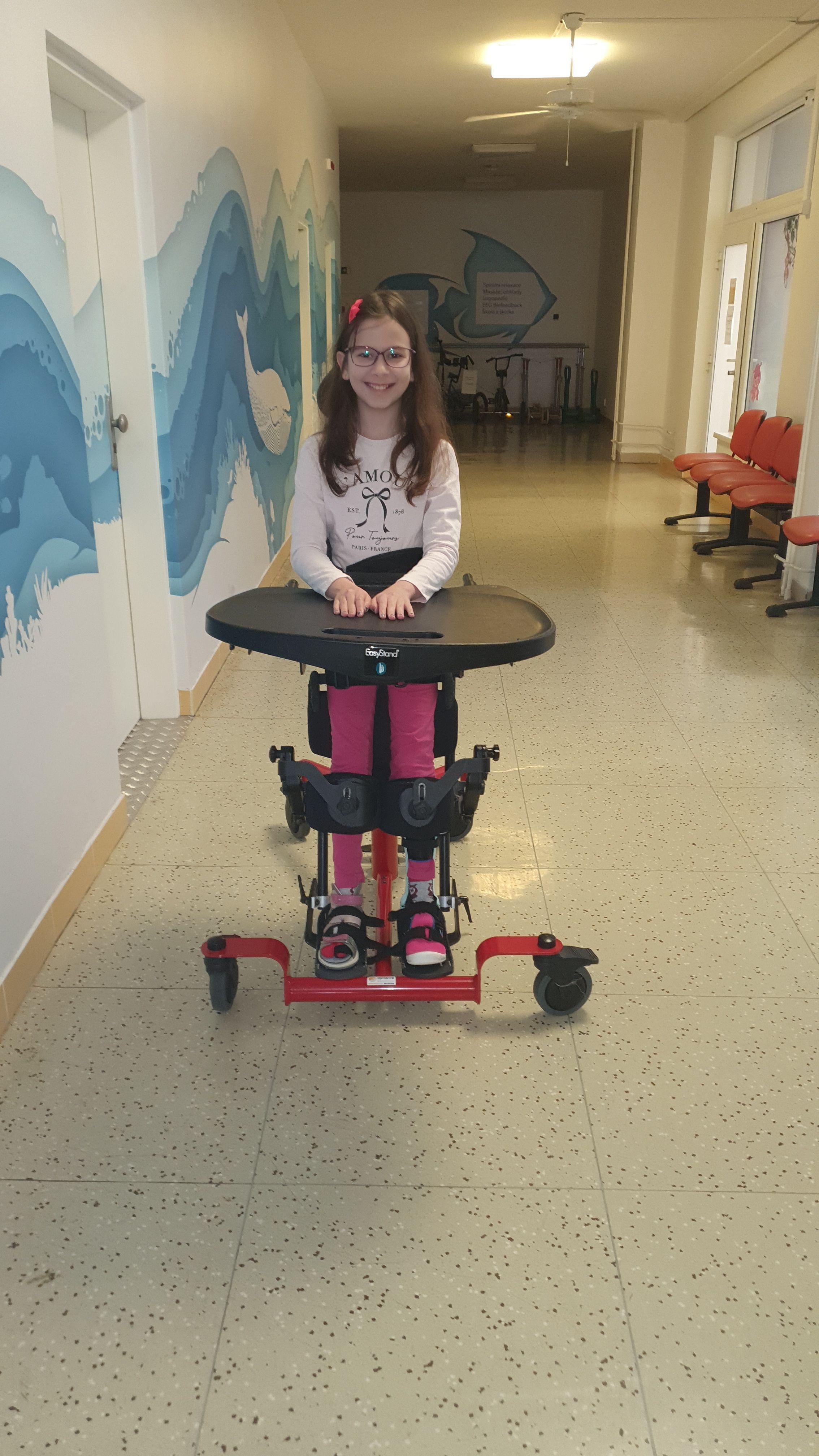
Mia
Mia is a 2.5-year-old girl who has already experienced life in four different families and whose brain was damaged during birth due to oxygen deprivation.
This little fighter has severe psychomotor developmental delays and currently functions at the level of a child around nine months old. She receives her nutrition through a tube directly into her stomach via a special pump and often vomits because she has severe reflux. Mia wears glasses with a +6.5 prescription to help her see the world, which fascinates her.
Mia is a very curious little girl who, despite her significant challenges, has learned to sit and crawl, is learning the sounds of animals, and constantly practices her mouth and tongue so that one day she can taste real food prepared in her new family.
Since May, Mia has been living with her new foster mother, who cares for her and also for a 15-year-old girl with atypical autism. Her foster mother exercises with Mia and works to help her eventually walk and run like other children.
How did the Advenťák runners help Mia?
The Advenťák runners provided Mia with a specially adapted stroller and arranged an intensive neurorehabilitation program for her.
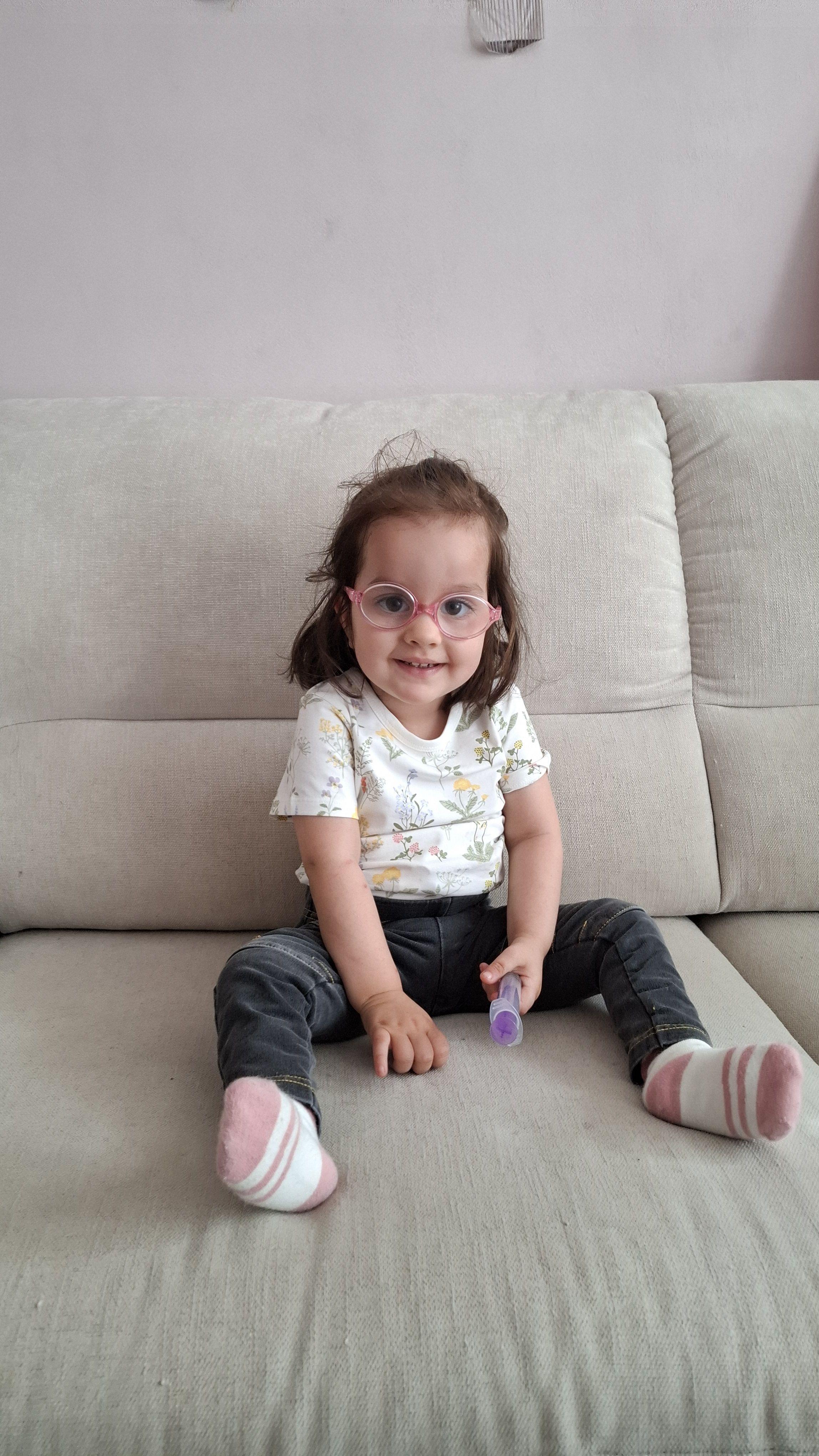
Amálka a Natálka
Natálka and Amálka were born prematurely as twins in the 29th week of pregnancy. Both girls have cerebral palsy, which affects their motor skills. Amálka can move partially on all fours, while Natálka is bedridden and suffers from severe spasticity in the muscles and joints of her limbs.
Their parents provide round-the-clock care for the girls. They regularly travel with them from Nejdek to a special school in Cheb, a total of 130 km. The school offers an individualized approach and an environment that supports the development of both girls.
The little girls need regular rehabilitation and complementary therapies, which help relax their muscles, improve posture, and contribute to their overall health. These therapies are financially demanding, and the family currently does not have enough resources, especially due to the costs of medications and special equipment.
In the past year, the situation was further complicated by a longer hospitalization of Amálka due to pneumonia. The father had to stay home with the other children, which resulted in a loss of part of the family’s income.
How did the Advenťák runners help Amálka and Natálka?
The Advenťák runners provided the young girls with intensive rehabilitation.
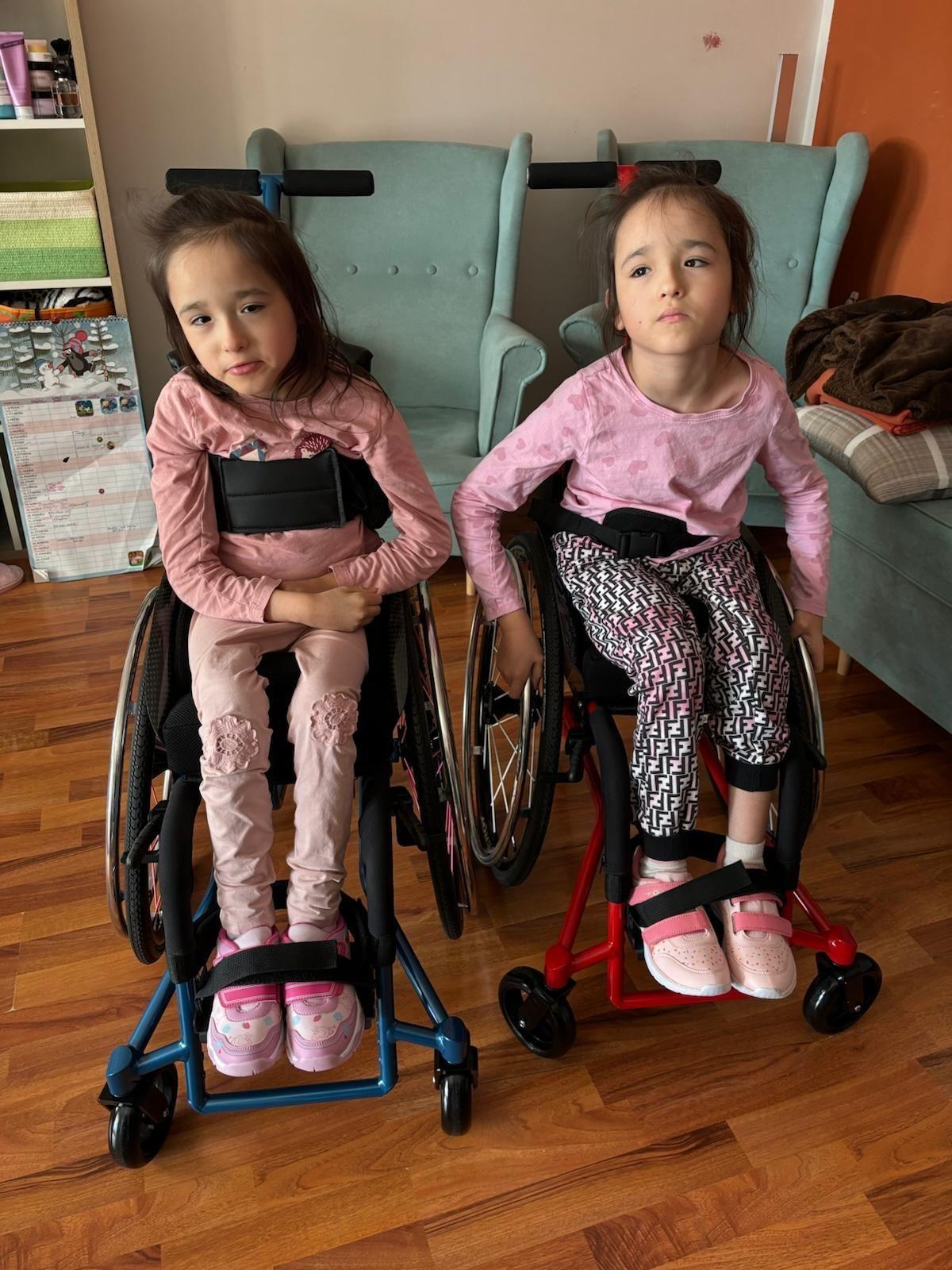
Tomášek
Tomášek was born eleven years ago, and right after birth, he wasn’t breathing. At first, none of the doctors knew what was wrong with him. It wasn’t until fourteen days later that one doctor thought he might have a very rare condition called Congenital Central Hypoventilation Syndrome (CCHS).
CCHS is a congenital disorder of the nervous system in which the brain cannot properly control breathing, especially during sleep. Most patients require mechanical ventilation to prevent suffocation and to be able to breathe.
Unfortunately, this diagnosis was confirmed very quickly in Tomášek’s case. At the beginning of his life, he was unable to breathe either during the night or during the day. Over time, this has improved, and if he isn’t sick or extremely tired, he can now breathe on his own during the day. However, he still needs mechanical ventilation at night.
In addition to CCHS, Tomášek also has severe intellectual disability and atypical autism as a result of a brain hemorrhage he suffered after birth.
How did the Advenťák runners help Tomášek?
The Advenťák Runners provided Tomáš with essential equipment: an oxygen concentrator and a suction device, and also arranged hippotherapy for him.
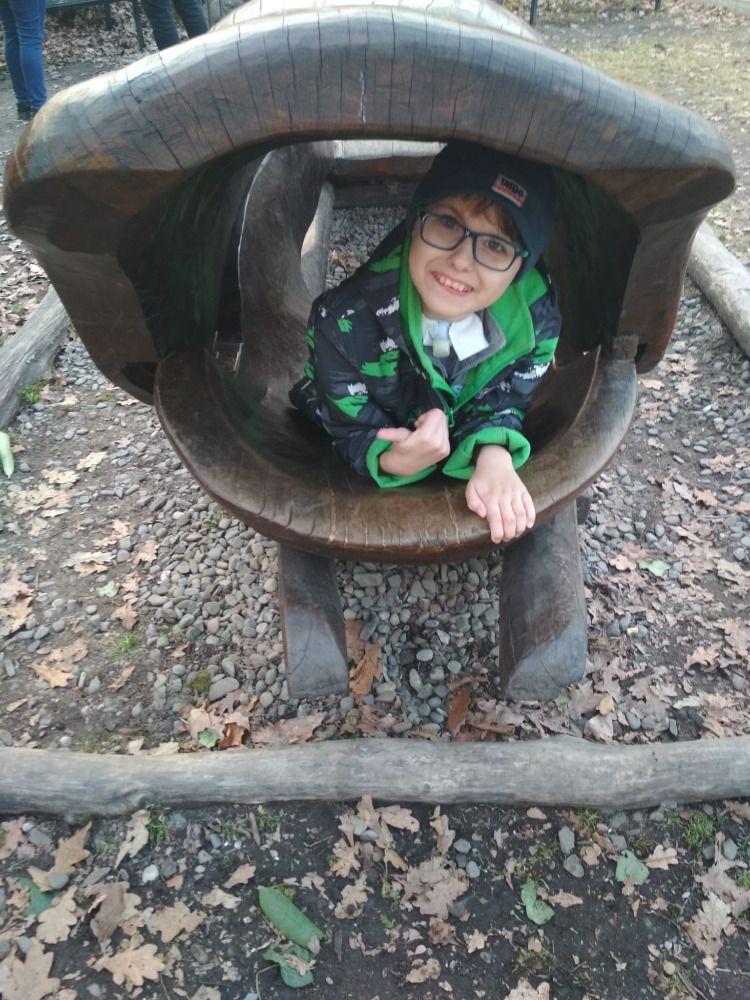
Terezka
Terezka is a beautiful thirteen-year-old girl who, almost three years ago, found herself in a completely different world. The family was just getting ready for a trip to the Beskydy Mountains, and Terezka went – as she always did – to dance in the small gym in the attic of their house. Unfortunately, she fell, and before anyone from the family could reach her to help her breathe again, she was left without oxygen for some time.
Since that accident in the gym, she has been in a vigilant coma – a special state between wakefulness and sleep. This young girl understands everything that happens around her and tries her best to respond, but her body doesn’t fully obey her yet. She is like a princess under a spell.
Every day is a battle. A battle for movement, for words, for contact. Her condition requires 24/7 care. Her mother has become not only her support, but also her nurse, physiotherapist, teacher, driver, and guide. Together, they are searching for a way to help Terezka return to full consciousness.
They are trying everything possible – from conventional medicine and various neurorehabilitation programs in the Czech Republic and Slovakia to alternative approaches such as Chinese medicine, Ayurveda, and craniosacral therapy, as well as healers – anyone who can bring even a spark of hope.
For the family, not only financial support is important, but also the awareness that others believe, too — that we believe Terezka’s condition can improve and that one day she will “wake up.”
How did the Advenťák runners help Terezka?
The Advenťák Runners covered the cost of intensive rehabilitation for Terezka.
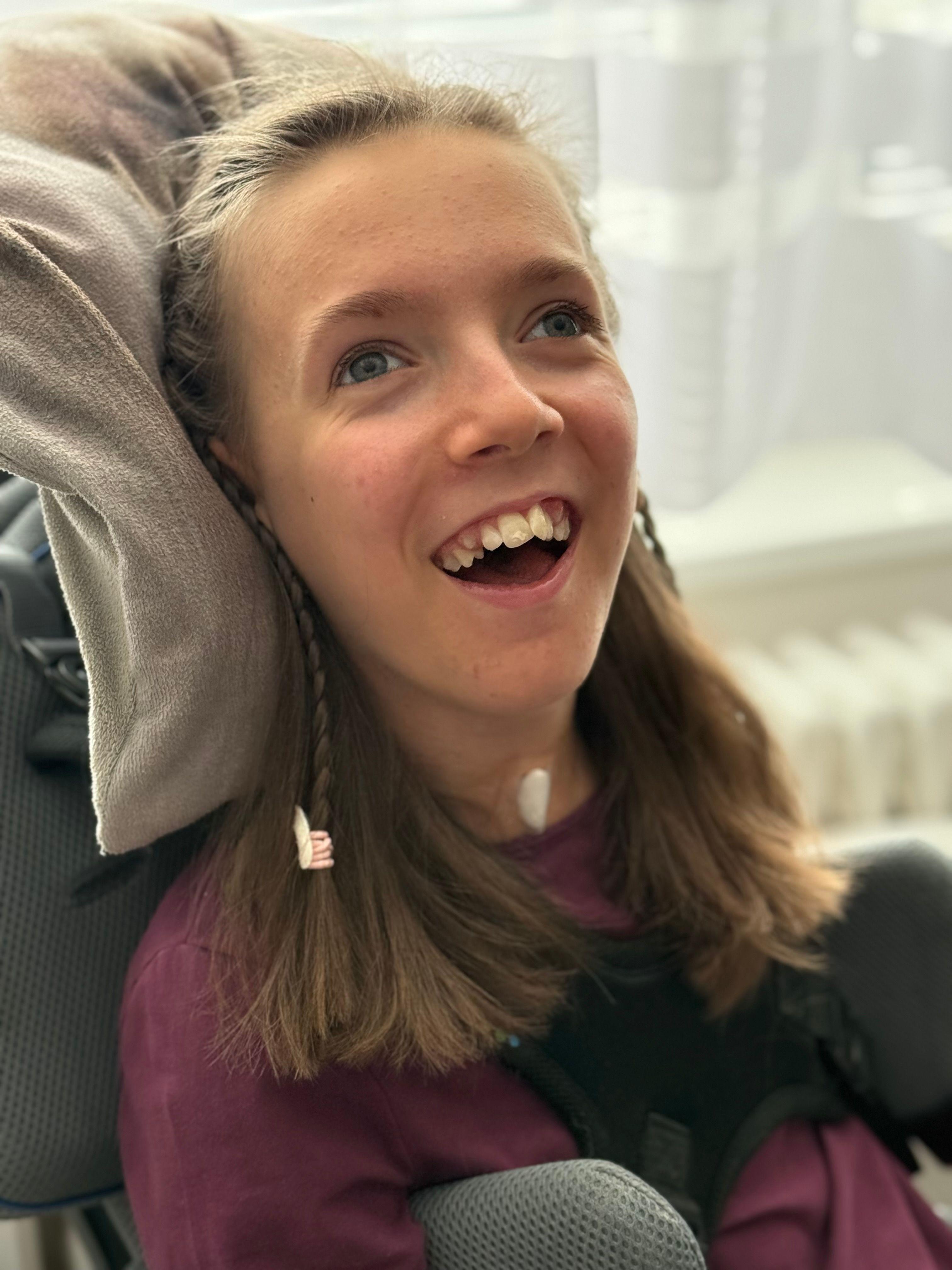
Filip
When Filípek was still in his mommy’s belly, he was a completely healthy baby. Unfortunately, complications occurred during his birth, and he was born showing no signs of life. The doctors managed to revive him, but the consequences of his difficult start in life are something he — and his whole family — carry to this day.
Today, Filípek is a ten-year-old boy diagnosed with perinatal encephalopathy, cerebral palsy, and epilepsy. He cannot walk, sit, or crawl and has a moderate intellectual disability. He relies on a wheelchair and requires 24-hour care.
Filípek loves trains, the metro, and all kinds of travel and trips.
Until recently, his dad carried him everywhere in a baby carrier, but Filípek has now outgrown it.
To make it possible for him to continue going on trips with his family — or even just spend time in the garden of their home in the countryside — he needs a special stroller.
How did the Advenťák runners help Filip?
The Advenťák Runners purchased a JOSI Wismi G2 special stroller for Filip.
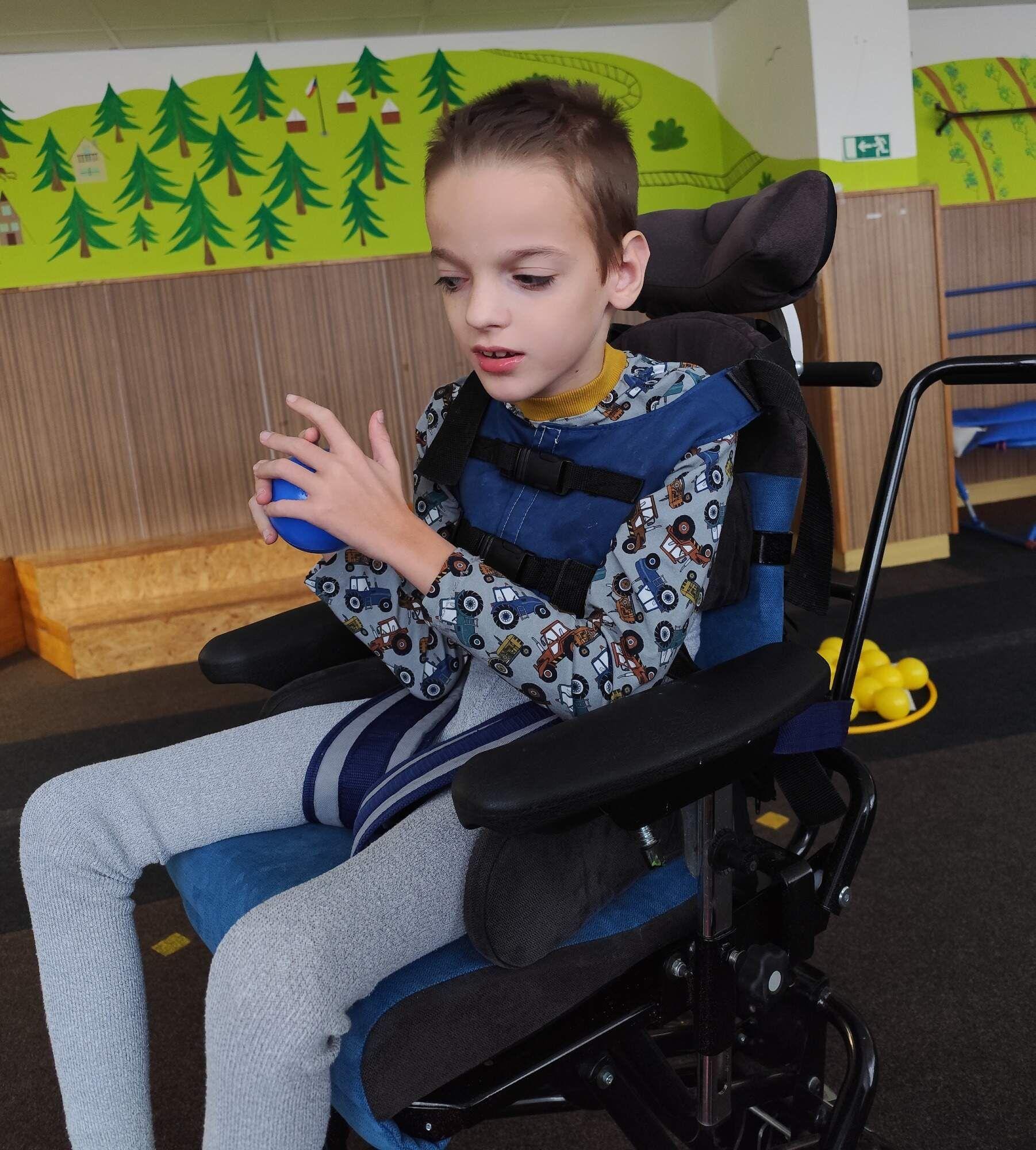
Dalibor
Dalibor is a five-year-old boy who loves swimming – and even competes in it – paraclimbing, and spending time with his best buddy, his three-year-old little brother Vilda. Starting in January, the two boys will attend the same kindergarten.
The only thing Dalibor can’t do as well as Vilda is walk.
Dalda was born as a seemingly healthy baby, but after six months he stopped developing as he should have. And so began a long journey through doctors and therapists.
On his first birthday, doctors identified the cause of his delayed development: spinal muscular atrophy type 2 (SMA type 2).
Within a month of the diagnosis, Dalibor received gene therapy, which allowed his body to start producing the missing protein. Thanks to that, the nerve cells were saved, leading to a stabilization of his muscle strength.
However, during the first year of his life, this insidious disease caused significant and irreversible damage to his small body. Thanks to continuous rehabilitation and the use of special orthoses from the company Pohlig, Danda still has hope that one day he will be able to learn to walk.
How did the Advenťák runners help Dalibor?
The Advenťák Runners provided Dalibor with custom orthotic braces by Pohlig.
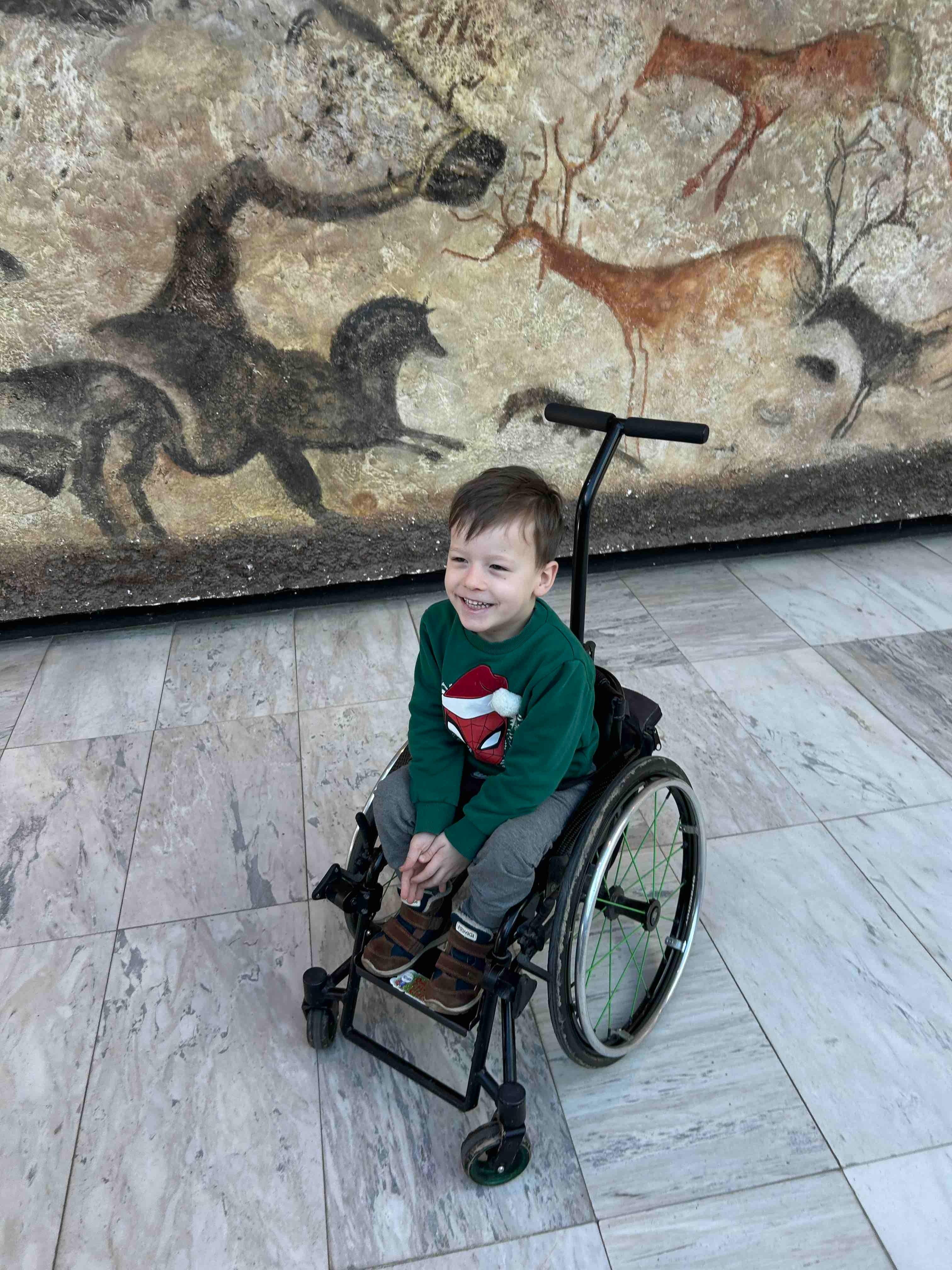
Eliška
Eliška is a young eighteen-year-old girl, a wonderful source of laughter and sunshine for everyone around her. Yet she is imprisoned in her own body. She was born as a long-awaited and miraculous child through IVF, initially completely healthy. In early childhood, she experienced difficulties with movement and proper turning, but these were successfully managed through rehabilitation.
Over time, she was diagnosed with cerebral palsy – spastic diparesis, later progressing to quadriparesis. She also developed scoliosis, breathing difficulties, and rapidly progressing deformities that caused her hands to twist. Eventually, Eliška completely lost the ability to speak.
Her condition affects the central motor neuron and is a complicated form of juvenile spastic hereditary paraplegia with a confirmed pathogenic variant in the ALS2 gene. She also suffers from a sleep disorder. Eliška is the only patient in the Czech Republic with this diagnosis. The course of her illness can be compared to the disease that affected scientist Stephen Hawking.
How did the Advenťák runners help Eliška?
The Advenťák runners provided Eliška with a rehabilitation stay.
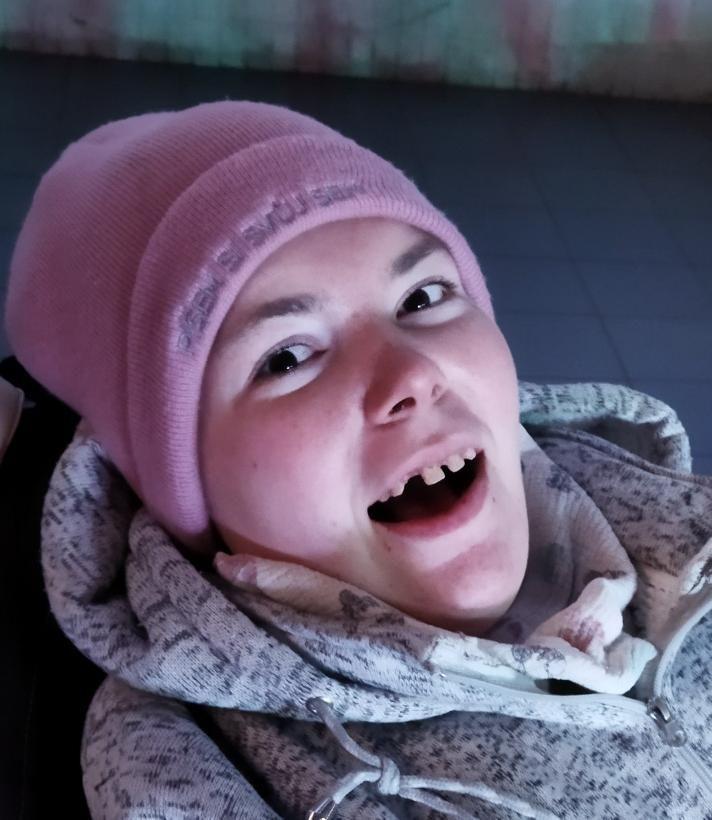
Ella
Ellinka, who recently celebrated her sixth birthday, was born as the second child in her family. At first, everything was developing well, but at four months her mother noticed that she was using her left hand less. At six months, she was diagnosed with cerebral palsy – left-sided hemiparesis.
Ella immediately began rehabilitation. She regularly attends physiotherapy, occupational therapy, speech therapy, and hippotherapy. She started going to spa treatments from the age of 15 months and continues to attend them twice a year, as clear progress is seen at each visit.
Now that Ella is older, the half-hour exercises covered by health insurance are unfortunately no longer sufficient. She needs more intensive rehabilitation sessions lasting at least 60 minutes.
How did the Advenťák runners help Ella?
The Advenťák runners provided Ella with a neurorehabilitation stay at the Klimkovice Spa – Reha Motion program.
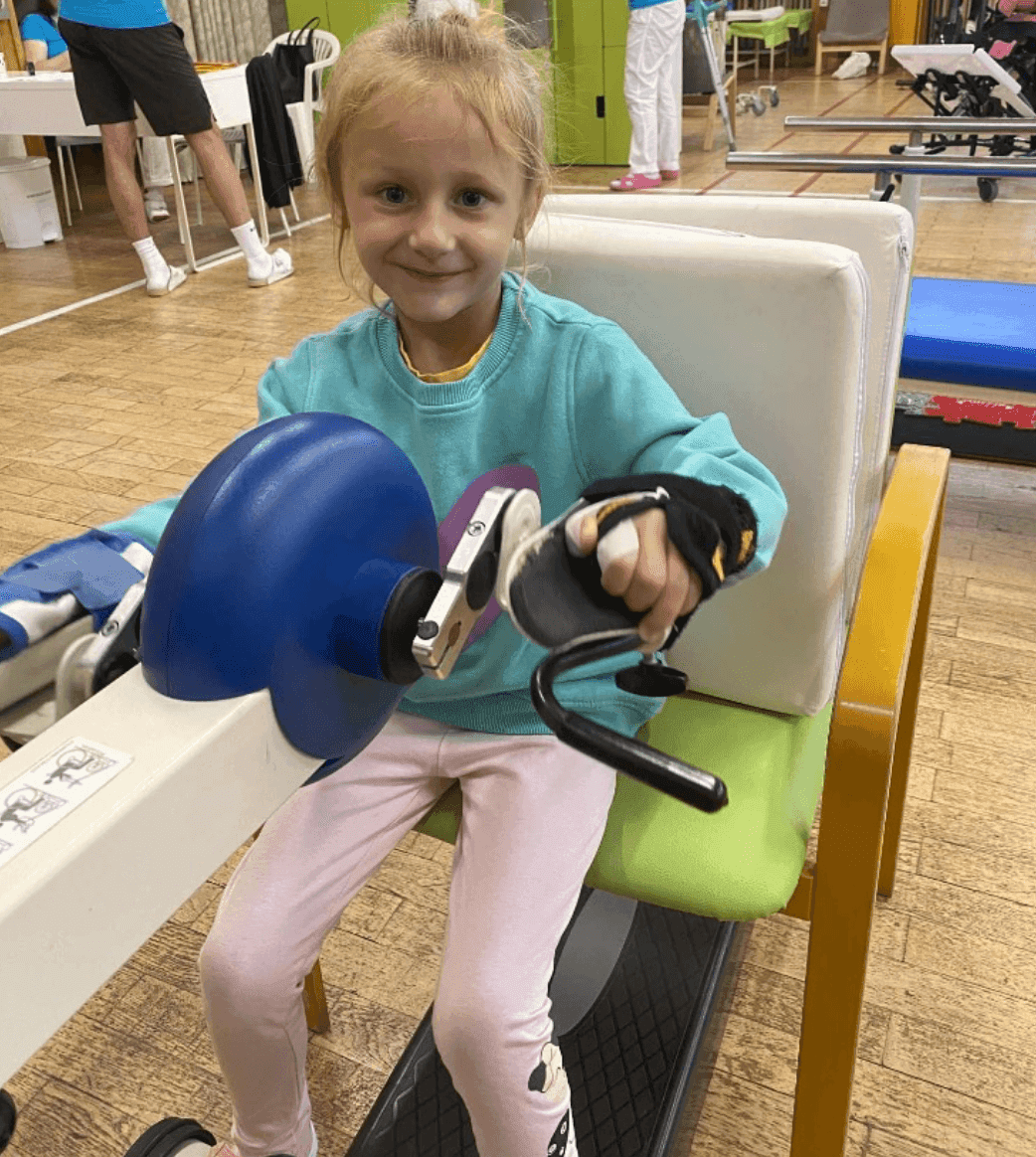
Jakub
Kuba is a ten-year-old boy who lives with a rare, very severe, incurable, and drug-resistant form of epilepsy – Dravet syndrome, often referred to as catastrophic epilepsy. He experienced his first epileptic seizure as a six-week-old baby. Despite taking a combination of four medications, he still has several seizures every day – ranging from absences and myoclonic seizures to large, multi-minute convulsive seizures with loss of consciousness and stopped breathing, which can be life-threatening.
Dravet syndrome also affects Kuba with intellectual disability, autism, ADHD, hyperactivity, and motor difficulties. Even at his age, he relies on a medical stroller. He has a weakened immune system, dysphagia, loss of appetite (he eats almost nothing and requires nutridrinks), and many other health complications. He must follow a strict daily routine – every seizure erases what he has previously learned. Seizures can be triggered by elevated body temperature (even a common cold is dangerous for him), fatigue, changes in environment, hot weather, and especially emotions – he must not become angry or overly excited.
Kuba has difficulty walking, speaks very little, cannot dress or feed himself without help, wears diapers, and requires full-time specialized care. Epileptic seizures can occur even at night. In addition, he has an extremely high risk of SUDEP – sudden unexplained death in epilepsy patients. For this reason, Kuba must be constantly monitored, especially at night, so that emergency intervention, administration of SOS medication to stop a seizure, or first aid and resuscitation can be performed promptly.
How did the Advenťák runners help Kuba?
The Advenťák runners provided Kuba with a nighttime epilepsy seizure monitor.
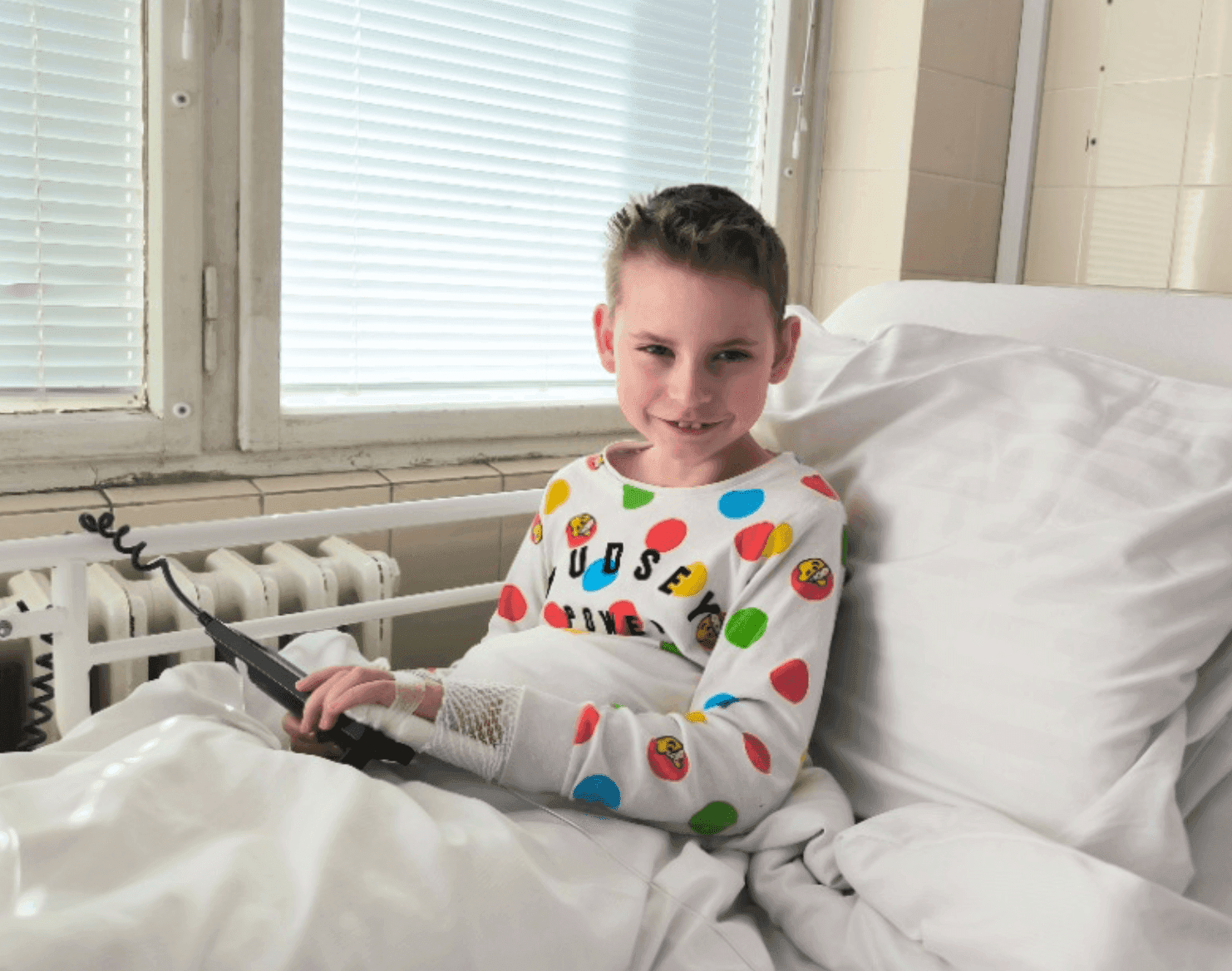
Jiří
Jiřík is a twenty-six-year-old young man who has been diagnosed with cerebral palsy – quadriparesis.
He grew very quickly, unfortunately asymmetrically – the left side of his body is larger (a bigger hand, shoe size 36 compared to 34 on the right) – which led to the development of rotational scoliosis, significantly affecting his quality of life. Surgical intervention at his age and health condition is very risky, so the approach chosen was intensive rehabilitation to prevent the scoliosis from worsening.
Jiřík attends outpatient rehabilitation three times a week and goes on rehabilitation stays four times a year, where he also undergoes additional procedures that greatly relieve painful spasms and strengthen his whole body.
How did the Advenťák runners help Jiřík?
The Advenťák runners provided Jiřík with a 14-day rehabilitation stay.
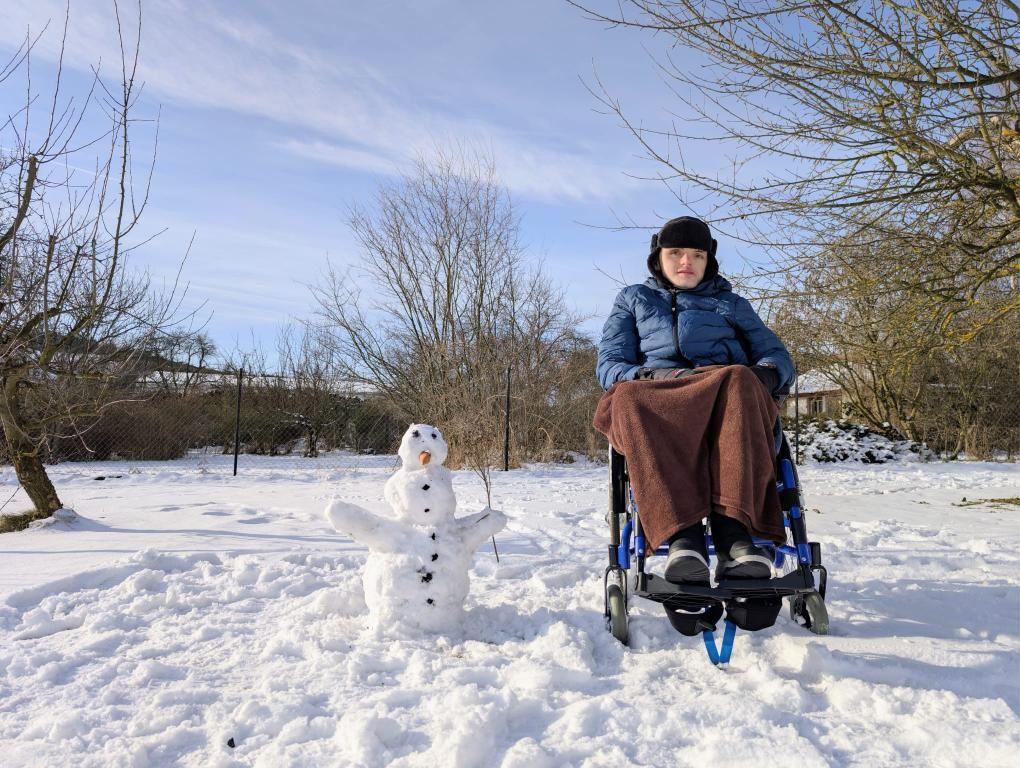
Martínek
Martínek has been dependent on a wheelchair since a difficult birth and requires continuous, 24-hour care. He is very capable and cheerful, attends a special school, and enjoys learning new things.
Until the very last minute of pregnancy, he was a completely healthy baby. Unfortunately, that final minute changed everything. After birth, he was not breathing and had to be resuscitated by doctors. They succeeded, but he began breathing on his own only after nearly half an hour. He still lives with the consequences today – he requires round-the-clock care, uses a wheelchair, and is practically unable to do anything independently.
Martínek is now 14 years old, but his motor skills correspond approximately to the level of a six-month-old child. Despite this, he is a capable, intelligent, and always smiling boy.
How did the Advenťák runners help Martínek?
The Advenťák runners provided Martínek with a rehabilitation stay at a sanatorium in Klimkovice.
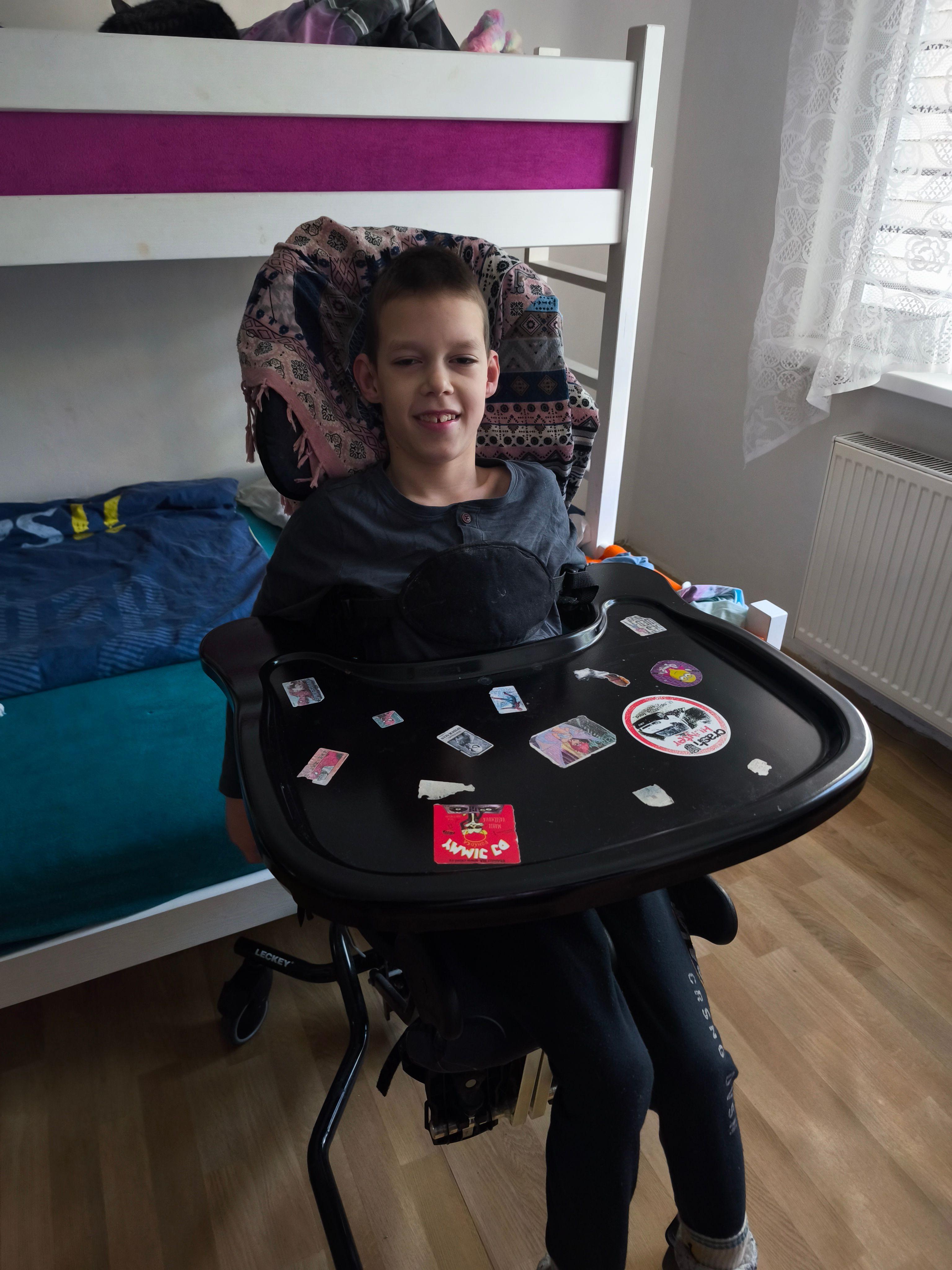
Mia
Miuška is a six-and-a-half-year-old girl. If everything had been normal, she would be starting first grade this September, but for now she attends a special preschool and uses a wheelchair. Already at birth, it was discovered that during an apparently uncomplicated pregnancy she had suffered a brain hemorrhage – the consequences of which she still lives with today.
Miuška cannot walk, but after six years of diverse and intensive rehabilitation, she is able to sit up and say a few words. She is currently experiencing a good period – her body and mind do not hurt her as much, her outbursts and anxieties have decreased, she laughs a lot, and she is exploring her limits. She experiments with controlling her wheelchair, tries out new words, and even looks forward to exercises and therapies that she used to cry through. She is opening up to the world, bringing great joy to everyone around her.
Miuška is already just past the age when children develop the fastest, but there is still progress to be made – the brain is plastic and will continue to develop. Another important stage that can slow progress in children with cerebral palsy is the onset of puberty – which means Miuška and her family still have a few years during which remarkable progress can be achieved.
How did the Advenťák runners help Mia?
The Advenťák runners provided Mia with rehabilitation and therapy sessions.
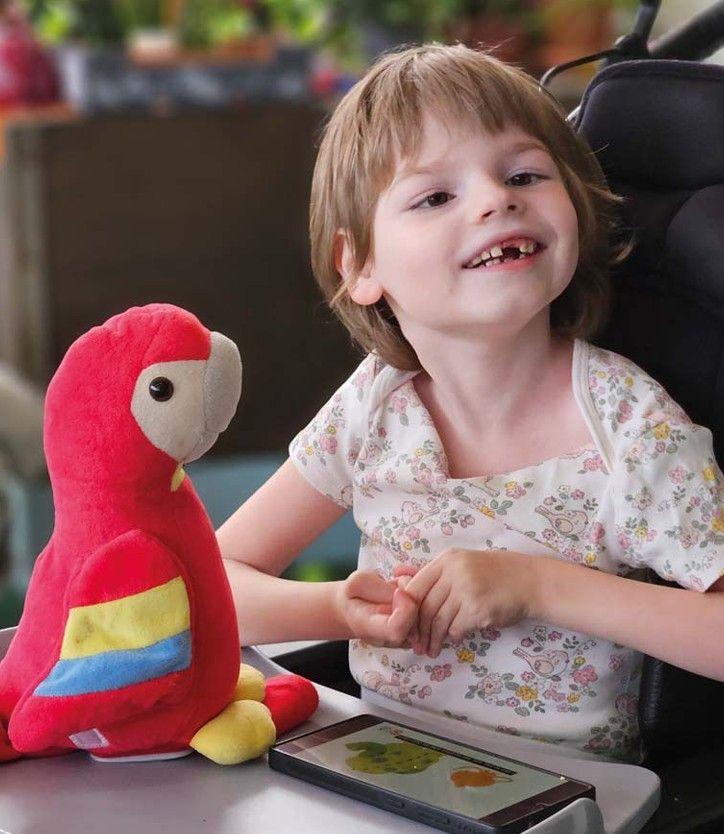
Nataniel
Nataniel is an eleven-year-old boy who is living with Duchenne muscular dystrophy, a rare genetic condition. This disease causes the gradual weakening of all the muscles in the body, including those necessary for walking, breathing, and everyday activities. Since last year, Nataniel has unfortunately been unable to walk and is completely dependent on his mother’s continuous care, 24 hours a day, 7 days a week.
The diagnosis came shortly before his parents’ wedding, and since then, the life of the entire family has changed fundamentally. Despite this, Nataniel is a smiling boy who loves space, cooking, and board games. Even with his illness, he takes part in running challenges from his wheelchair.
His mother, Michaela, who herself battled acute leukemia in childhood, now devotes all her strength to caring for her son. Despite her own difficult life journey, she also helps others – she adopted an unwanted beagle named Drago.
How did the Advenťák runners help Nataniel?
The Advenťák runners provided Nataniel with neurorehabilitation at the Astra Center.
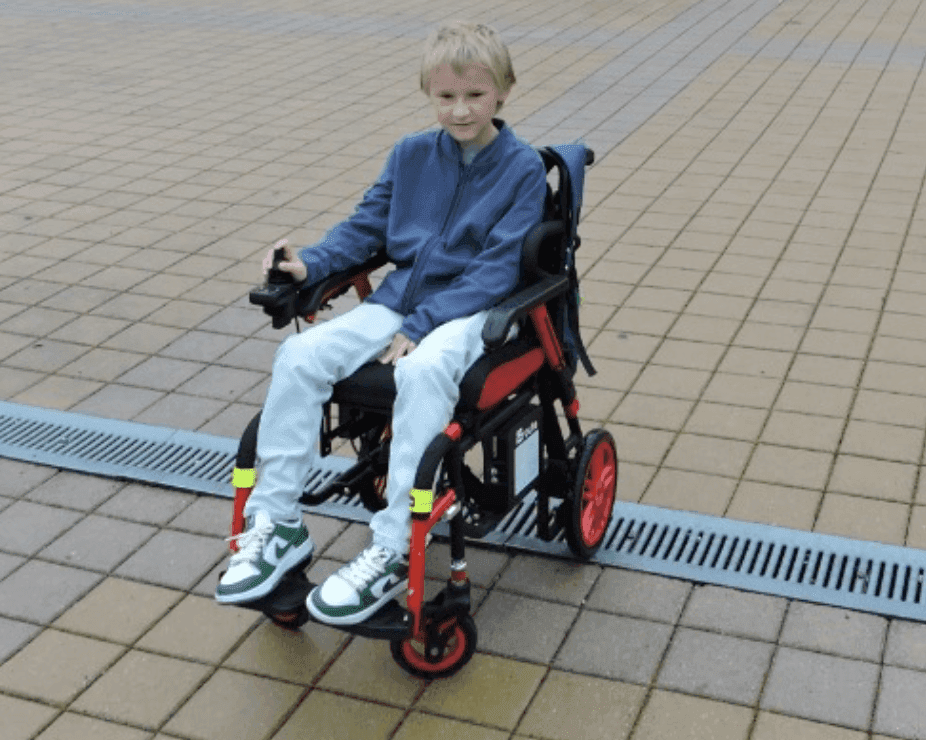
Peťulka
Péťa is a five-year-old boy who has been diagnosed with Duchenne muscular dystrophy. This condition will gradually take away his strength, his ability to walk, and the ability to drink or feed himself. In addition, he struggles with developmental dysphasia – his speech corresponds roughly to that of a two-and-a-half-year-old – and attention deficit disorder (ADHD). The only medication that slightly slows the loss of his walking ability unfortunately causes a side effect in the form of high blood pressure.
Physiotherapy is especially important for Péťa to maintain his quality of life and slow the development of contractures – shortening of the tendons and spinal deformities. Hippotherapy helps him not only to strengthen his muscles and improve posture but also has a positive effect on his mental well-being.
Since there is no cure for Duchenne muscular dystrophy, therapies are the only way to improve Péťa’s quality of life and, when possible, relieve his pain.
How did the Advenťák runners help Péťa?
The Advenťák runners provided Péťa with hippotherapy, physiotherapy, speech therapy, and necessary vitamins.
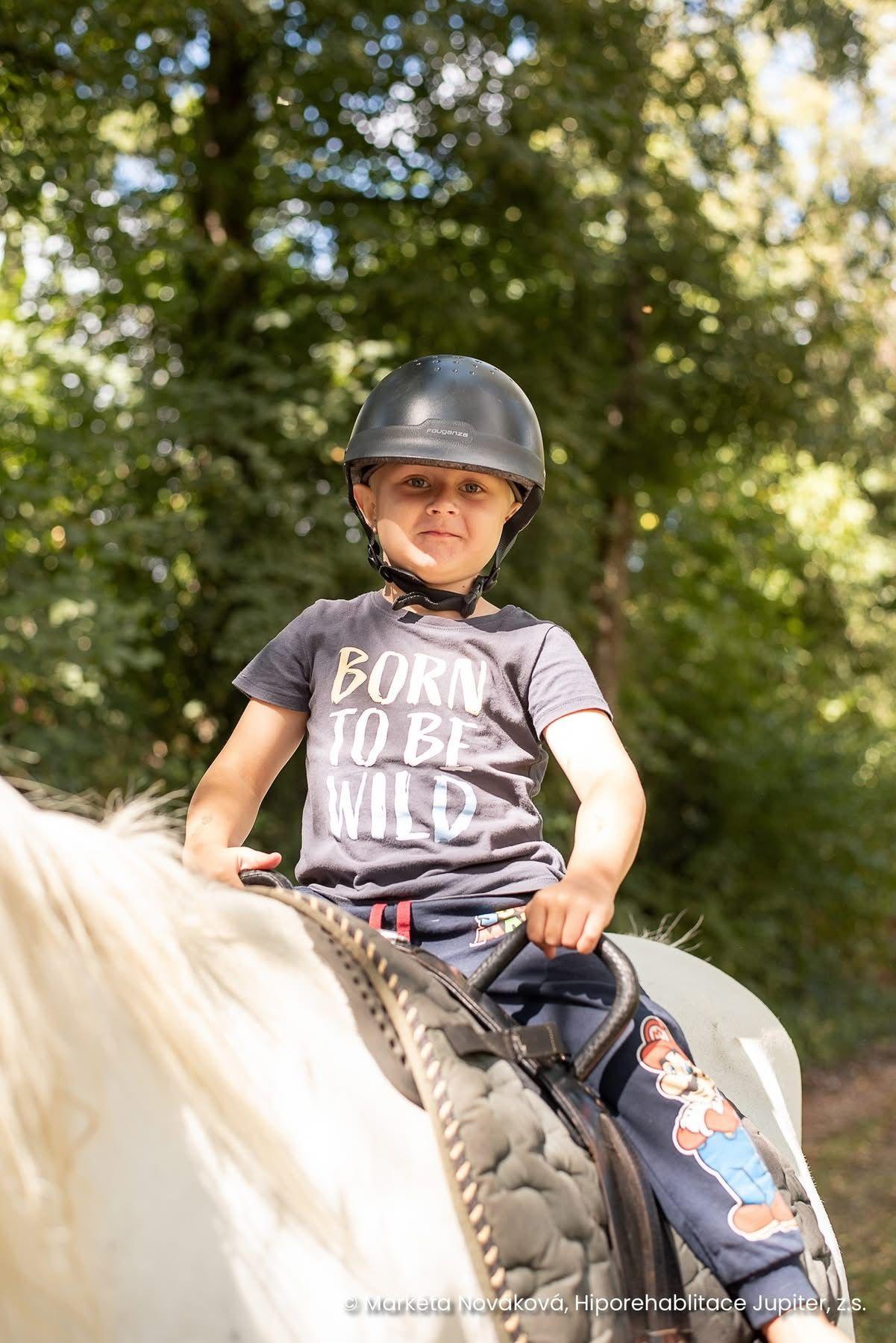
Sašík
Sašík was born as a healthy boy who thrived during the first six months of his life. However, after his first year, he experienced a seizure in the form of convulsions, preceded by high fevers, and was taken to the hospital by the emergency medical service. Since then, he has been experiencing epileptic seizures and undergoing numerous regular examinations, during which hypotonia and delayed psychomotor development were diagnosed.
Recently, Sašík was diagnosed with a genetic condition – spinocerebellar ataxia. He is the only patient in the Czech Republic with this condition. His parents are doing their best to support his development, even though the prognosis is not very promising. More about his journey can be found on the website sasik.cz.
How did the Advenťák runners help Sašík?
The Advenťák runners provided Sašík with a three-month rehabilitation program at the Hájek Center.
Sofinka
Eight-year-old Sofinka suffers from the most severe form of spinal muscular atrophy – a disease that takes away her muscles, her breath, and her ability to move. Yet she does not give up.
Despite all the hardship she has endured in hospitals, despite the tens of thousands of kilometers she has had to travel for treatment, and despite her significant physical disability, she is a little girl who shares smiles with everyone around her. She is sociable, bright, and curious. She loves spending time with her friends, enjoys good food, educational programs, puzzles, and even school. She likes wearing dresses, getting into mischief, playing cards, reading books, and she absolutely loves swimming.
How did the Advenťák runners help Sofinka?
The Advenťák runners provided Sofinka with a rehabilitation stay, which she needs on a regular basis.
